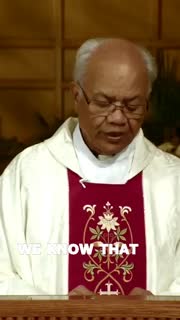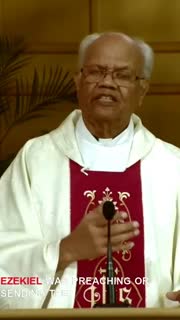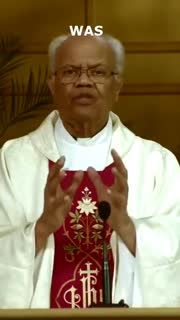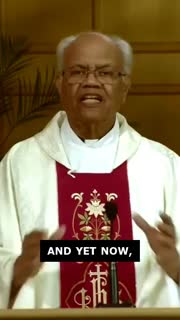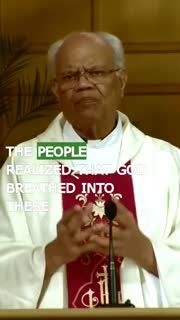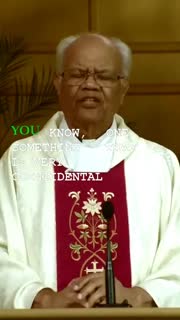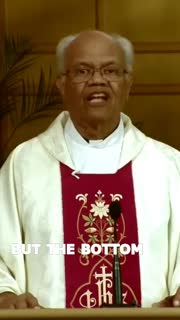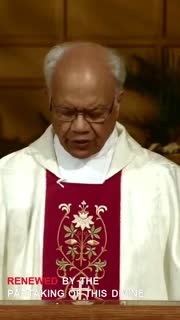Finding Hope and Renewal Through Faith and Love
Devotional
Sermon Summary
Bible Study Guide
Sermon Clips
1. "We know that this television Mass brings meaning to the lives of tens of thousands of Canadians across our land and around the world, and they join me in thanking our donor for the gift of this Mass. Today, we celebrate the Feast of St. Rose of Lima. Her real name was Isabel, or Elizabeth, but she was so beautiful that they nicknamed her Rose, and that was the name that stayed. She had many suitors, but... She wanted to dedicate her life to the Lord." [00:56] (32 seconds)
2. "Ezekiel was preaching or sending the message to the exiles in Babylon. Their hope was totally lost. They knew that they could never get back to restore Judah and their temple in Jerusalem. In fact, their whole life was like those bones. Lifeless, without hope, and without a desire to carry on. And in the midst of all this, Ezekiel tells them that the Lord is going to take care of them, which is very difficult to believe when they are in exile." [10:39] (40 seconds)
3. "But there was a remnant even in exile, a remnant that kept the commandments, that realized that the covenant was something sacred. They observed the Sabbath. And because of this remnant, that small flame was still there alive. The flame of faith was alive in exile. But the hopelessness was there, as we see in Psalm 137, by the rivers of Babylon. That, too, has been made famous by Boney M, another Afro-American group that sang. And it says, by the rivers of Babylon we sat down." [11:28] (41 seconds)
4. "And yet now, Ezekiel speaks about God, who will breathe into these bones. The word of God will make these bones come anew. There will be flesh and sinews and skin. Now, we have to be very careful. This is not a story of resurrection. In fact, they could not get their mind around the idea of life after death. These bones that would come back to life would only have a few things that are different from our everyday life. They wouldn't have aches and pains. They wouldn't have warts and wrinkles. They wouldn't have diseases." [12:50] (41 seconds)
5. "The people realized that God breathed into these bones and brought them alive. And they could remember when God made the first human beings. He breathed into them the breath of life and breathed to them from all the four winds to show that God was omnipresent. In every direction, God was going to take care of them. What a beautiful idea. And it is an idea that you and I have to hold together because there are times when we feel like those dead bones ourselves, when everything seems to be falling apart, when there is no hope in our lives, and we feel, what's the point in carrying on?" [14:19] (43 seconds)
6. "You know, one something that is very coincidental is we're celebrating the Feast of St. Rose of Lima. And if you go to Lima, Peru today, and go to the Church of San Francisco, you will find a crypt on the side full of bones. When the dead were given to the monks in order to be buried, they would bury them with lye and with other caustic materials. So, when the bodies disintegrated, they gathered the bones together and put it in a crypt. If St. Ignatius said, when you want to pray and meditate, imagine all these things happening." [15:00] (37 seconds)
7. "But the bottom line is, God cares for us and breathes life whenever we despair. God bless you all." [15:37] (10 seconds)
8. "Renewed by the partaking of this divine gift, we pray, O Lord, that by the example of Saint Rose of Lima, bearing in our body the death of Jesus, we may strive to hold fast to you, O Lord, through Christ our Lord. Amen." [26:19] (16 seconds)
Ask a question about this sermon
2. "Ezekiel was preaching or sending the message to the exiles in Babylon. Their hope was totally lost. They knew that they could never get back to restore Judah and their temple in Jerusalem. In fact, their whole life was like those bones. Lifeless, without hope, and without a desire to carry on. And in the midst of all this, Ezekiel tells them that the Lord is going to take care of them, which is very difficult to believe when they are in exile." [10:39] (40 seconds)
3. "But there was a remnant even in exile, a remnant that kept the commandments, that realized that the covenant was something sacred. They observed the Sabbath. And because of this remnant, that small flame was still there alive. The flame of faith was alive in exile. But the hopelessness was there, as we see in Psalm 137, by the rivers of Babylon. That, too, has been made famous by Boney M, another Afro-American group that sang. And it says, by the rivers of Babylon we sat down." [11:28] (41 seconds)
4. "And yet now, Ezekiel speaks about God, who will breathe into these bones. The word of God will make these bones come anew. There will be flesh and sinews and skin. Now, we have to be very careful. This is not a story of resurrection. In fact, they could not get their mind around the idea of life after death. These bones that would come back to life would only have a few things that are different from our everyday life. They wouldn't have aches and pains. They wouldn't have warts and wrinkles. They wouldn't have diseases." [12:50] (41 seconds)
5. "The people realized that God breathed into these bones and brought them alive. And they could remember when God made the first human beings. He breathed into them the breath of life and breathed to them from all the four winds to show that God was omnipresent. In every direction, God was going to take care of them. What a beautiful idea. And it is an idea that you and I have to hold together because there are times when we feel like those dead bones ourselves, when everything seems to be falling apart, when there is no hope in our lives, and we feel, what's the point in carrying on?" [14:19] (43 seconds)
6. "You know, one something that is very coincidental is we're celebrating the Feast of St. Rose of Lima. And if you go to Lima, Peru today, and go to the Church of San Francisco, you will find a crypt on the side full of bones. When the dead were given to the monks in order to be buried, they would bury them with lye and with other caustic materials. So, when the bodies disintegrated, they gathered the bones together and put it in a crypt. If St. Ignatius said, when you want to pray and meditate, imagine all these things happening." [15:00] (37 seconds)
7. "But the bottom line is, God cares for us and breathes life whenever we despair. God bless you all." [15:37] (10 seconds)
8. "Renewed by the partaking of this divine gift, we pray, O Lord, that by the example of Saint Rose of Lima, bearing in our body the death of Jesus, we may strive to hold fast to you, O Lord, through Christ our Lord. Amen." [26:19] (16 seconds)
